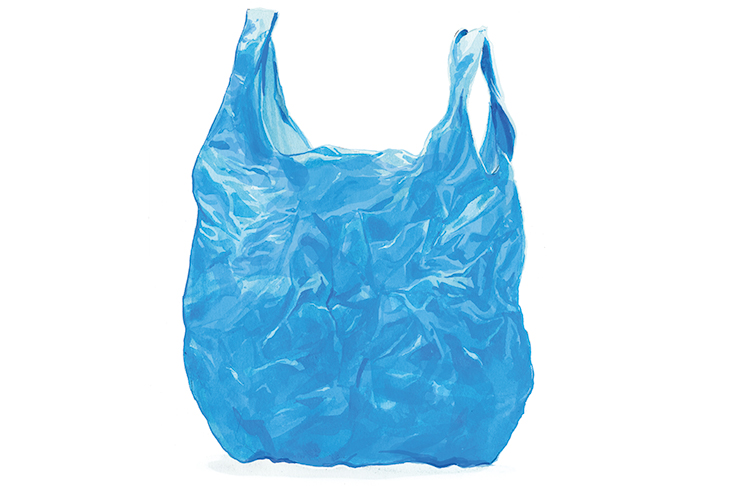Has an albatross ever wielded so much influence? The bewildered chick who regurgitated a plastic bag in front of Sir David Attenborough’s camera crew — fed to him by his mother after she had scooped it from the sea — has caused one of those regular ructions in public opinion. The supermarket chain Iceland has announced it would phase out all plastic packaging from its own-brand foods. The compulsory 5p charge on supermarket plastic bags is to be extended to all shops in England and a 25p ‘latte levy’ may be put on coffee cups containing plastic. Plastic ‘microbeads’ have been banned from cosmetic products.
Such initiatives are largely a reflection of a sudden and violent public concern over plastic. It has become the bogeyman among concerned citizens who previously rushed out to buy water butts and composters, or who forsook Tesco for farmers’ markets in order to buy locally sourced food. Just as shoppers now like to be seen going shopping with hessian bags, ministers now carry their coffee around in re-usable bamboo cups. These were given them as a present, it transpires, by environment secretary Michael Gove. It will not be long before people who walk down the street clutching a plastic bag begin to attract disapproving stares. Once, government was content with encouraging recycling of plastic. Now, especially as China has banned imports of waste plastic from Britain and elsewhere, plastic must now be edited out of our lives for good. The supermarkets have eagerly joined in. Tesco has phased out single-use plastic bags from its stores altogether. Marks and Spencer have announced that they’ll discontinue plastic-wrapped £2 ‘cauliflower steaks’ after they caused an outrage on Twitter. Retailers sense the sharp turn in the public mood and are scrabbling to respond.
It’s not hard to see why everyone’s worried about plastic. The seas are unquestionably heavily polluted with plastic, as are some rivers and streams. Frans Timmermans, vice-president of the European Commission, this week declared war on ‘single-use plastics that take five seconds to produce, are used for five minutes, then take 500 years to break down again.’ It’s utterly depressing to think that plastic bags, yoghurt pots and disposable cups will be the chief archaeological relics of our age.
But when public opinion is so much in agreement on an issue, we should all be on our guard. It’s exactly when everyone agrees about an issue that bad decisions are made, some with awful and far-reaching unintended consequences.
The trouble with the new plastic obsession is the same trouble we had with carbon emissions 20 years ago. Environmental policy becomes so focused on one specific, fashionable problem that no one notices that the proposed solutions are, in other ways, making matters worse. In the case of carbon emissions, the Blair government (along with the European Commission) became so fixated in cutting the amount of CO2 that they encouraged motorists to switch to diesel — inadvertently sanctioning an increase in deadly nitrogen oxide emissions.
This is the risk we now face with the war on plastic. If supermarkets follow through on their recent promises, it’s a struggle to see how they will keep fruit and veg fresh for long. The very people we’ve tried so hard to encourage to eat well will revert back to Turkey Twizzlers. It is easy now to forget what shopping was like before supermarkets transformed the British diet in the 1970s, before chiller cabinets and the revolution in food packaging. The choice in the village shop where I then lived was between shrivelled carrots and tinned peas. That the traditional seasonal shortage of fresh vegetables was eliminated owes a lot to plastic packaging. How long now before we start reading: ‘Doctors warn of decreasing consumption of fresh fruit and vegetables’?
You’re only really entitled to feel virtuous about eschewing plastic if you look carefully into the effect on the environment of your chosen alternative. Take Gove’s coffee cup. There have already been rumblings about overharvesting of bamboo in China’s Sichuan Province. There is more general concern, too, about the wide-scale use of plant-based alternatives to oil-derived plastics. It’s the same as the argument about biofuels — they take over vast amounts of arable land, which might otherwise be used to grow food. As long as bioplastic (already used by some supermarkets for organic food) remains a niche product for concerned middle classes, the land issue isn’t important. If bioplastics are adopted across industry, it will be a genuine cause for concern.
According to a report on the environmental impact of bioplastics published by the government in 2010, it takes 1.7 square metres of arable land to grow each kg of PLA, one of the main bioplastics, which can be used as a substitute for many types of food packaging. Europe consumes almost 60 million tonnes of plastic a year. If all this packaging were instead grown in fields, it would take up 40,000 square miles — nearly a tenth of all arable land currently under cultivation in Europe. And what about the carbon emissions from biodegradable plastics? They tend to decompose straight to methane, a greenhouse gas measured to have 20 times the potency of CO2. If our main concern is climate change, then we’re actually better off using plastic made from petrochemicals — either recycling or burning them once they have outlived their useful lives.
What is remarkable about the war against plastics is that hostilities were first started a decade and a half ago, but were stopped in their tracks by some powerful evidence. The plastic bag tax was first tried in Ireland in 2002, when a 15 cent charge per bag was similarly found to cut bag use by 90 per cent. If shoppers are doing what I sometimes do — going without any kind of bag and trying to balance numerous items in their hands — that can be counted as an environmental gain. But if they have switched to other types of bag then the benefits are harder to discern. When a plastic bag tax was proposed in Scotland, the devolved government launched a two-year assessment comparing the ‘life-cycle analysis’ of single-use plastic bags against paper bags. In 2005, it came to the surprising conclusion that a ‘paper bag has a more adverse impact than a plastic bag for most of the environmental issues considered’.
Six years later, Defra compared the environmental impact of plastic bags with its rivals. That study came to the remarkable conclusion that a cotton shopping bag would have to be used 173 times before it became responsible for fewer carbon emissions than a plastic bag — cotton being a very intensive crop requiring large amounts of water and fertiliser.
The study also considered the effect of bags on resource depletion, acid rain, pollution of rivers with algae, toxicity on humans, toxicity on freshwater plants and creatures, marine life, land ecology and the production of smog. Even assuming that shoppers do use their cotton bags 173 times, they still came out worse than single-use plastic bags on all but two environmental measures, including the effect on marine life. A cotton bag might not cause sea creatures the problems filmed in Blue Planet, but the run-off of fertilisers used in cotton production was measured to have worse effect overall.
Single-use plastic bags also performed better environmentally than paper bags and biodegradable plastic bags and plastic ‘bags for life’. And this was assuming that ‘single-use’ plastic bags are just that — when of course they are often used for other purposes, such as bin liners. When Wales introduced its own 5p plastic bag levy seven years ago, it led to a 25 per cent surge in the sales of pedal bin liners — to replace the supermarket bags that people had previously been using. Moreover, the plastic bag levy has done nothing to counter the wasteful packing being used in online sales — such as the enormous cardboard box delivered to my house last week containing two flannels.
Surely, if we were going to have levies on bags, the evidence suggests that it ought to apply to all kinds of bags and all kinds of packaging. Yet the plastic bag levy went ahead anyway, as if no research had been conducted into the issue. It’s just not in the interest of government to look into the full environmental impact of a widely popular plastic tax. We consumers care but we’re busy. We just don’t really want to be told — as Lionel Shriver explains in her column — that our careful measures are actually counterproductive.
We must do something to stop plastic bags, bottles and beads clogging up the sea. A better idea might be a waste disposal deposit on all such goods, a surcharge which could then be returned to whoever presented it for recycling. That would give all waste a value, providing an incentive for people to collect it. Would beaches be littered with plastic bags if enterprising children were picking them up in order to claim a deposit, just as in my youth kids used to do with lemonade bottles? The government is consulting on a deposit scheme for plastic bottles. But why stop there?
Policymaking does not always follow logic. On the environment in particular it tends to dart between fashionable issues, ignoring complexities. For aesthetic reasons, it’s hard to like plastic. That gives the drive to banish it from modern life its particular momentum. But I suspect it won’t be long before we feel the need to reinvent it.
Got something to add? Join the discussion and comment below.
Get 10 issues for just $10
Subscribe to The Spectator Australia today for the next 10 magazine issues, plus full online access, for just $10.
You might disagree with half of it, but you’ll enjoy reading all of it. Try your first month for free, then just $2 a week for the remainder of your first year.















Comments
Don't miss out
Join the conversation with other Spectator Australia readers. Subscribe to leave a comment.
SUBSCRIBEAlready a subscriber? Log in